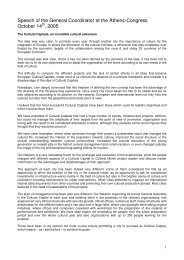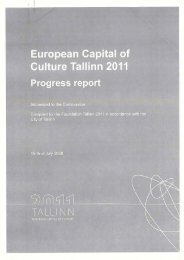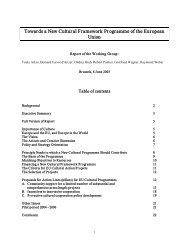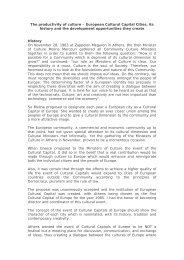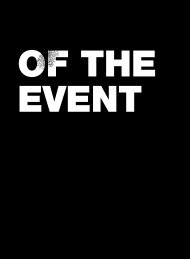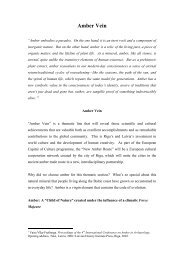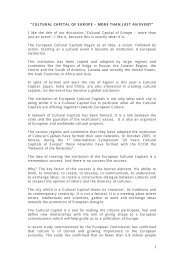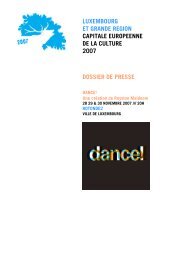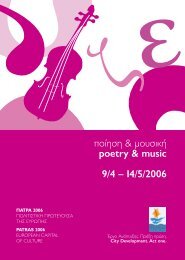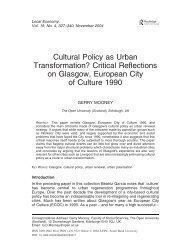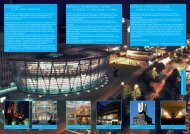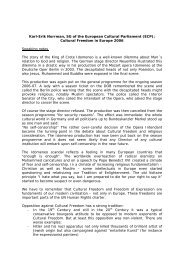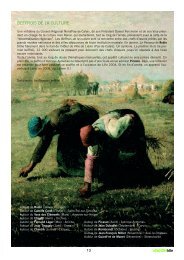Concise.pdf - Brugge Plus
Concise.pdf - Brugge Plus
Concise.pdf - Brugge Plus
- No tags were found...
Create successful ePaper yourself
Turn your PDF publications into a flip-book with our unique Google optimized e-Paper software.
32<br />
BRUGGE 2002<br />
New media and technology<br />
Dance was also present in Format 2002, a<br />
new festival based on new media and<br />
technology in the performing arts,<br />
which was organised by BRUGGE 2002 together<br />
with the Bruges Cultural Centre<br />
(Cultuurcentrum <strong>Brugge</strong>). Peter Roose<br />
was the curator of this multifaceted festival.<br />
Thus we had Charleroi/Danses<br />
with Body/Leisure, a sparkling dance<br />
show with choreography by Fréderic<br />
Flamand and a monumental décor by<br />
top architect Jean Nouvel. The Belgian<br />
youth group HushHushHush danced<br />
Bobo in Paradise, in which hiphop was<br />
combined with provocative, almost<br />
mechanical bodily movements. The<br />
German company Lilja performed the<br />
graceful production Les Petits Poissons by<br />
Cirque Plume<br />
choreographer Samir Akika, in which<br />
dancers went about tackling the physical interaction with the film medium in an<br />
unconstrained Tarantino style. The dancers of the Japanese group Leni-Basso went a<br />
step further here, and waged a genuine war of attrition with their bodies, in a cutting<br />
and hypnotising multimedia production entitled Finks. And then there was Paixão by<br />
As Palavras, which was premièred in Bruges. For this dance piece on passion,<br />
Claudio Bernardo drew inspiration from Pasolini’s film version of the Gospel according<br />
to Saint Matthew.<br />
However, Format 2002 was more than dance. There were various musical performances<br />
in which contemporary classical music was combined with projections and<br />
images in visual combinations, such as Ballet Mecanique by the Hermes Ensemble,<br />
Screens by Champ d’Action and Blattwerk by Arne Deforce. The celebrated IPEM<br />
organised a three-day workshop for young composers on the theme of new technology<br />
in music. The results were played on the last day of Format 2002, which closed<br />
with Le Bal Digital, with various DJs and VJs, including Walter Verdin. Granular<br />
Sythesis was in Belgium for the first time and presented the highly meditative sound<br />
and video performance Areal.<br />
In the field of word and image, there was the lovely, intimate but surprising performance<br />
Les Aveugles/The Blind. The Canadian company Théâtre Ubu turned<br />
Maurice Maeterlinck’s piece into a “technological phantasmagoria” with masks,<br />
sound tapes and projections.<br />
Just about the most ambitious project within Format was the new creation Philoctetes<br />
by Eric Joris, with a text by Peter Verhelst. He drew inspiration from the Greek myth<br />
of Philoctetes and described the war within the body against wounds and decay, and<br />
connected to this, the human relationship with technology. It was an autobiographical<br />
production that left a lasting impression, with Paul Antipoff, paralysed to the<br />
neck, as actor and user of a computer-controlled installation.<br />
Finally there was a Format circuit with various installations, such as Archive by The<br />
Wooster Group, Pedestrian by Paul Kaiser and Riverbed, Katafalk by cie Mossoux-<br />
Bonté and an installation by Eric Joris and his group Crew.<br />
© CIRQUE PLUME<br />
Format 2002 was an important experiment. On an artistic level, it was a revelation<br />
for Bruges, and far beyond. Projects that had never before been performed or shown<br />
were presented here. Despite the unknown content, public interest was certainly satisfying,<br />
and the final evaluation was also extremely positive.



